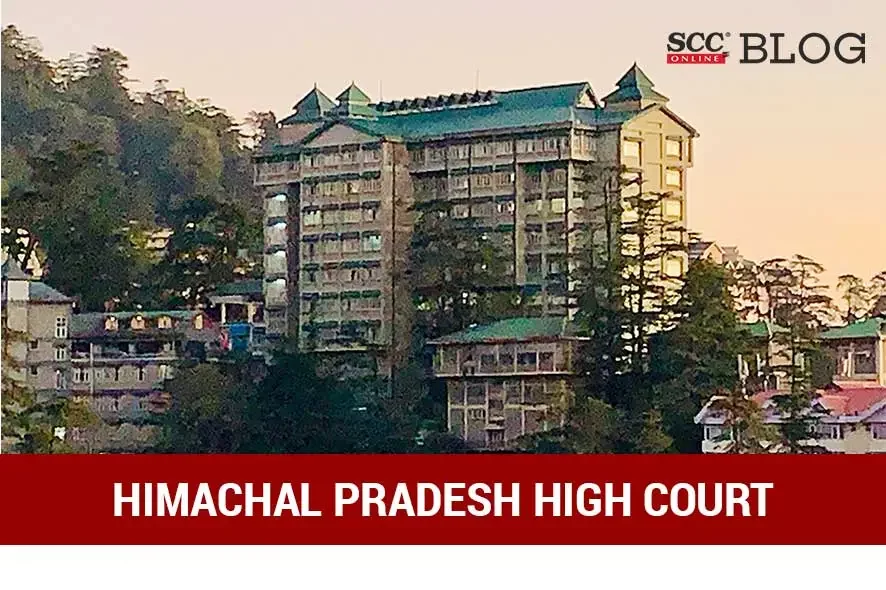Himachal Pradesh High Court: In a petition filed by the petitioner to quash the FIR and the challan pending before the Court of Judicial Magistrate, First Class-V, Shimla, Rakesh Kainthla* J., opined that the contents of FIR did not satisfy the ingredients of Section 354-D of the Penal Code 1860 (‘IPC’), as in the present case, there was no proof that the petitioners had contacted Respondent 2 to foster a personal relationship. Thus, the Court quashed FIR registered under Sections 354D and 201 of the IPC and held that the proceedings would continue against the petitioners for the commission of offence punishable under Sections 504, 506 and 509 of IPC.
Background
In an instant case, Respondent 2 made a complaint to the police and stated that the petitioner had constructed a four-five storeys house on the upper side of her house and installed a CCTV camera in the courtyard of his balcony, which was facing the lintel of Respondent 2’s house. Further, the respondent suspected that the petitioner and his sons used to watch her when she used to hang her clothes and undergarments on the lintel for drying due to which she could not go to the roof of her house. Respondent 2’s husband asked the petitioner to remove the CCTV camera or to change its direction to his house and even complained to the police. The petitioner was asked by the police to remove the CCTV camera and to show the footage in the control panel, but petitioner refused to do so. Therefore, the police registered FIR and conducted investigations. After the completion of investigations, the challan was prepared and presented before the Court.
Thus, the petitioner filed the present petition to quash the FIR and the challan pending before the Court of Judicial Magistrate, First Class-V, Shimla.
The petitioner asserted that Petitioner 1 was a respectable member of the family and his relative held respectable positions in society, and the FIR was filed to harass the petitioners and spoil the careers of their sons. The petitioners further stated that a civil dispute was pending between the parties regarding the boundaries and asserted that the FIR was filed to harass the petitioners. The police did not conduct the investigation properly and since the construction work was going on at the time of the registration of the FIR, the CCTV camera was installed to monitor the same. Further, the petitioners contended that they had two residences and their stay in the building was casual, hence, it was necessary to surveillance the building.
Analysis, Law, and Decision
The Court relied on Supriya Jain v. State of Haryana, (2023) 7 SCC 711, Gulam Mustafa v. State of Karnataka, 2023 SCC OnLine SC 603, and opined that the power under Section 482 of the Criminal Procedure Code 1973 (‘CrPC’), could be exercised to prevent the abuse of process or secure the ends of justice. The Court could quash the FIR if the allegations did not constitute an offence or make out a case against the accused. However, it was not permissible for it to conduct a mini trial to arrive at such findings.
Further, the Court opined that it was apparent from the bare perusal of the Section 354D of the IPC, that a person should have followed a woman or contacted such woman to foster personal interaction or should have monitored the use by the woman of the internet, email or any other form of electronic communication. However, in the present case, there was no proof that the petitioners had contacted Respondent 2 to foster a personal relationship. Further, the respondent did not state that she was using any form of electronic communication that was monitored by the petitioners. Thus, the Court relied on Jai Prakash v. Shiva Devi, and opined that the contents of FIR did not satisfy the ingredients of Section 354-D of IPC.
The Court noted that Section 201 of the IPC was added by the police, because the petitioners did not supply the recording of CCTV, which was required in connection with the commission of offence punishable under Section 354D of the IPC. Thus, the Court dismissed the charge under Section 201 of IPC, since no offence punishable under Section 354D of the IPC was made out against the petitioners.
The Court also noted that the police had also added Sections 504, 506, and 509 of the IPC. The Court relied on State of Maharashtra v. Maroti, (2023) 4 SCC 298, and opined that it was not permissible for the Court to say at the present stage that no offences punishable under Section 504, 506 and 509 of the IPC had been made out against the petitioners.
The Court noted that the petitioners impleaded Amar Ujala as Respondent 4, and opined that simply because the petitioners feel aggrieved by the publication of news items, was no reason to implead them in a petition seeking quashing of FIR.
Thus, the Court quashed FIR registered under Sections 354D and 201 of the IPC and held that the proceedings would continue against the petitioners for the commission of offence punishable under Sections 504, 506 and 509 of IPC. Additionally, the Court stated that Respondent 4 was unnecessarily dragged into the current case and directed the petitioner to pay a cost of Rs. 5,000 to Respondent 4.
[Sumehar Chand Narwal v. State of H.P., 2024 SCC OnLine HP 85, decided on 10-01-2024]
*Judgment authored by- Justice Rakesh Kainthla
Advocates who appeared in this case:
For the Petitioners: Sunil Kumar, Advocate;
For the Respondents: R.P. Singh, Deputy Advocate General, Meera Devi, Advocate, Legal-Aid Counsel, Prince Chauhan, Advocate, vice Rahul Mahajan, Advocate







